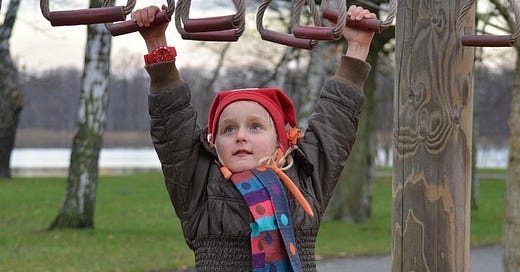3 Questions to Help Your Kids Build a Growth-Mindset
Why goals can backfire—and what great coaches and parents focus on instead.
Hello Bar-Setters!
I love coaching books. One of my favorites is Nick Saban’s How Good Do You Want to Be?
Saban’s philosophy is rooted in a relentless commitment to what he calls “the process.” He doesn’t coach outcomes. He coaches execution.
Let’s say his team is down by six with two minutes to go. The quarterback shouldn’t be thinking, I have to win this game. He shouldn’t even be thinking, We have to score.
Sure, he has to understand the situation—the clock, the tempo, the urgency.
But that is mostly internalized. As such, his mind should stay locked on the task at hand.
What are his reads on this play?
What must he do to sell his play fakes and ensure the play works as intended?
What body language and communication style must he embody to best motivate his teammates?
As Saban writes:
“One of my messages to the team… was this: Every time you think of winning the national championship—stop. Instead, think of what you have to do to dominate your opponent for sixty minutes.”
Leadership expert Jon Gordon shares a similar insight:
Don’t focus on your goals—focus on your commitments.
Set the goal, yes. But that’s just the start. From there, the only thing that matters is:
What will you do every day to reach it?
A Level Deeper: What Spirit are You Working With?
Legendary NBA Coach Phil Jackson echoes these sentiments, with this coaching adage from his book Eleven Rings:
“Focus on the spirit, not the scoreboard.”
Everyone knows the goal. But what separates champions is that they focus on the behavior required to get there. With enough practice, the specific behaviors are automated and the focus turns to the spirit and doggedness required, rather than any specific performance keys.
Praise the Process, Not the Person
These ideas are in line with Carol Dweck’s essential research on the growth mindset.
Dweck found that when students are praised for innate qualities—like being “smart”—they become more risk-averse and less persistent. They protect their identity by avoiding failure.
In contrast, when students are praised for their effort, they lean into challenge.
They try harder problems. They persist longer. They believe their abilities can grow—because they’ve experienced that growth through effort. More still, they’ve learn to take pride in giving effort and persisting through challenge. This is a much better identity to take on since each student’s effort is all he or she can control.
3 Questions to Promote a Growth Mindset
Unfortunately, kids and adolescents are exceptionally status-oriented. It is very difficult for them to focus on the process rather than the status stakes involved. As such, we have to help them fight that tendency.
If we want kids (and adults) to improve, we must stop focusing on how they perform—and start praising how they work.
This all sounds great in theory. But in practice, it’s hard.
When we watch our kids compete or learn, it’s natural to focus on outcomes:
Did they win?
Did they get the right answer?
Are they reading well?
It takes intentional effort to shift that lens.
In his book, With Winning in Mind, Olympic gold medalist Lanny Bassham offers three questions that parents can ask their children after any performance. These questions help to ingrain a growth mindset:
What did you do well?
What did you learn?
How will you get better?
These questions reframe the experience as feedback, not judgment. They teach kids to analyze, adjust, and improve—which is the entire point of practice.
If You Don’t Have a Growth Mindset, They Won’t
A final point. Growth Mindset has become a bit of a buzzword. Many places have tried to use it is a teaching strategy that can be employed. In my book, I warn against this:
It is not enough to profess the virtues of a growth-mindset and to occasionally praise effort… What makes an impact is the real operating system that drives our culture. Do we celebrate failure and risk-taking?
Are students empowered to engage in an honest, high-quality dialectic or do we maintain the illusion that all opinions are equally valid?
Praising effort requires a clear standard of excellence. There has to be a sense of the way you should conduct your business. Do you play the game the right way?
Most importantly, to appreciate the benefits of a growth-minded culture, teachers must be learners, themselves. Teachers who love learning are always sparking debates and connecting class topics to new ideas that they are learning about. This is the difference between the outcome-oriented developmental strategy that dominates youth development today and one that understands that lifelong learning is essential in order for our children to create fulfilling lives. Learning has merit in and of itself. It is the very essence of a life well-lived.
Thank you for reading and sharing!
Shane




